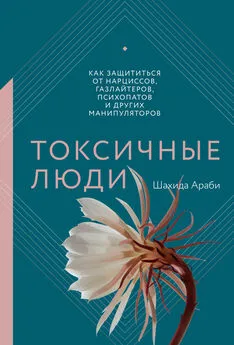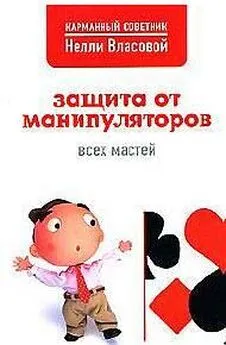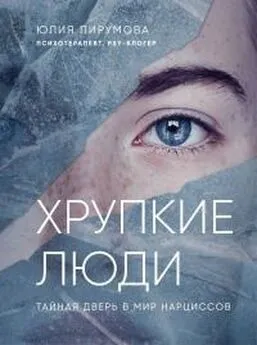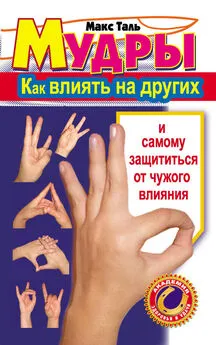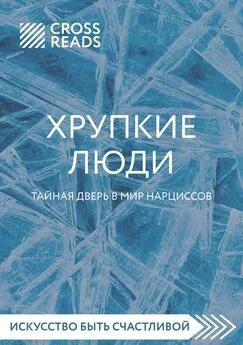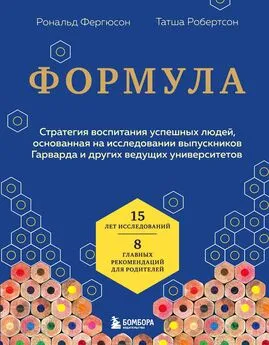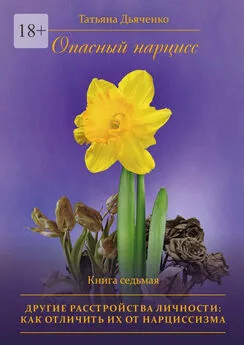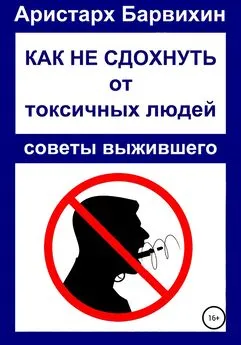Шахида Араби - Токсичные люди. Как защититься от нарциссов, газлайтеров, психопатов и других манипуляторов
- Название:Токсичные люди. Как защититься от нарциссов, газлайтеров, психопатов и других манипуляторов
- Автор:
- Жанр:
- Издательство:Литагент МИФ без БК
- Год:2021
- Город:Москва
- ISBN:9785001696728
- Рейтинг:
- Избранное:Добавить в избранное
-
Отзывы:
-
Ваша оценка:
Шахида Араби - Токсичные люди. Как защититься от нарциссов, газлайтеров, психопатов и других манипуляторов краткое содержание
Для всех, кто хочет устанавливать свои правила в общении с токсичными людьми и не позволять манипулировать собой.
На русском языке публикуется впервые.
Токсичные люди. Как защититься от нарциссов, газлайтеров, психопатов и других манипуляторов - читать онлайн бесплатно ознакомительный отрывок
Интервал:
Закладка:
Mogilski, J. K., and L. L. Welling. 2017. “Staying Friends with an Ex: Sex and Dark Personality Traits Predict Motivations for Post-Relationship Friendship.” Personality and Individual Differences 115: 114–119.
Morey, A., A. L. Gold, K. S. Labar, S. K. Beall, V. M. Brown, C. C. Haswell, J. D. Nasser et al. 2012. “Amygdala Volume Changes in Posttraumatic Stress Disorder in a Large Case-Controlled Veterans Group.” Archives of General Psychiatry 69(11): 1169.
Motzkin, J. C., J. P. Newman, K. A. Kiehl, and M. Koenigs. 2011. “Reduced Prefrontal Connectivity in Psychopathy.” Journal of Neuroscience 31(48): 17348–17357.
National Domestic Violence Hotline. 2018. “Why We Don’t Recommend Couples Counseling for Abusive Relationships.” February 18. Accessed October 9, 2018. https://www.thehotline.org/2014/08/01/why-we-dont-recommend-couples-counseling-for-abusive-relationships.
Navarro, J. 2017. Dangerous Personalities: An FBI Profiler Shows How to Identify and Protect Yourself from Harmful People. Emmaus, PA: Rodale.
Neff, K. 2011. “The Chemicals of Care: How Self-Compassion Manifests in Our Bodies.” HuffPost.com, August 27. Accessed February 8, 2020. https://www.huffpost.com/entry/self-compassion_b_884665.
Newberg, A. B., and M. R. Waldman. 2013. Words Can Change Your Brain: 12 Conversation Strategies to Build Trust, Resolve Conflict, and Increase Intimacy. New York: Plume.
Odendaal, J., and R. Meintjes. 2003. “Neurophysiological Correlates of Affiliative Behaviour Between Humans and Dogs.” Veterinary Journal 165(3): 296–301.
O’Haire, M. E., N. A. Guérin, and A. C. Kirkham. 2015. “Animal-Assisted Intervention for Trauma: A Systematic Literature Review.” Frontiers in Psychology 6: 2.
Olds, J., and P. Milner. 1954. “Positive Reinforcement Produced by Electrical Stimulation of Septal Area and Other Regions of Rat Brain.” Journal of Comparative and Physiological Psychology 47(6): 419–427.
Orloff, J. 2018. The Empath’s Survival Guide: Life Strategies for Sensitive People. Boulder, CO: Sounds True.
Pacella L., B. Hruska, and D.L. Delahanty. 2013. “The Physical Health Consequences of PTSD and PTSD Symptoms: A meta-analytic review. Journal of Anxiety Disorders , 27(1): 33–46.
Palgi, S., E. Klein, and S. G. Shamay-Tsoory. 2016. “Oxytocin Improves Compassion Toward Women Among Patients with PTSD.” Psychoneuroendocrinology 64: 143–149.
Pipe, J. 2014. “Stonewalling vs. Empathy.” May 1. Accessed February 28, 2019. http://tapestryassociates.com/stonewalling-vs-empathy.
Reis, H. T., S. M. Smith, C. L. Carmichael, P. A. Caprariello, F. Tsai, Rodrigues, and M. R. Maniaci. 2010. “Are You Happy for Me? How Sharing Positive Events with Others Provides Personal and Interpersonal Benefits.” Journal of Personality and Social Psychology 99(2): 311–329.
Rhodes, A., J. Spinazzola, and B. van der Kolk. 2016. “Yoga for Adult Women with Chronic PTSD: A Long-Term Follow-Up Study.” Journal of Alternative and Complementary Medicine 22(3): 189–196.
Rockliff, H., P. Gilbert, K. McEwan, S. Lightman, and D. Glover. 2008. “A Pilot Exploration of Heart Rate Variability and Salivary Cortisol Responses to Compassion-Focused Imagery.” Clinical Neuropsychiatry 5(3): 132–139.
Sarkis, S. 2017. “Are Gaslighters Aware of What They Do?” Psychology Today , January 30. Accessed February 16, 2020. https://www.psychologytoday.com/us/blog/here-there-and-everywhere/201701/are-gaslighters-aware-what-they-do.
Schrodt, P., P. L. Witt, and J. R. Shimkowski. 2013. “A Meta-Analytical Review of the Demand/Withdraw Pattern of Interaction and Its Associations with Individual, Relational, and Communicative Outcomes.” Communication Monographs 81(1): 28–58.
Schulze, L., I. Dziobek, A. Vater, H. R. Heekeren, M. Bajbouj, B. Renneberg, Heuser, and S. Roepke. 2013. “Gray Matter Abnormalities in Patients with Narcissistic Personality Disorder.” Journal of Psychiatric Research 47(10): 1363–1369.
Schwartz, A. 2017. The Complex PTSD Workbook: A Mind-Body Approach to Regaining Emotional Control and Becoming Whole. Berkeley, CA: Althea Press.
Sherman, D. K., and G. L. Cohen. 2006. “The Psychology of Self-Defense: Self-Affirmation Theory.” Advances in Experimental Social Psychology 38: 183–242.
Sibold, J., E. Edwards, D. Murray-Close, and J. J. Hudziak. 2015. “Physical Activity, Sadness, and Suicidality in Bullied US Adolescents.” Journal of the American Academy of Child & Adolescent Psychiatry 54(10): 808–815.
Sieben, N. 2013. “Stories of Healing Emotional Trauma in My Acupuncture Clinic.” NicholasSieben.com, January 30. Accessed February 7, 2020. https://nicholassieben.com/stories-of-healing-emotional-trauma-in-my-acupuncture-clinic.
Simon, G. 2018. “Personalities Prone to Narcissistic Manipulation.” January 13. Accessed October 12, 2018. https://www.drgeorgesimon.com/personalities-prone-to-narcissistic-manipulation.
Smyth, J. M., J. R. Hockemeyer, and H. Tulloch. 2008. “Expressive Writing and Post-Traumatic Stress Disorder: Effects on Trauma Symptoms, Mood States, and Cortisol Reactivity.” British Journal of Health Psychology 13(1): 85–93.
Stein, T. 2016. “Narcissist or Sociopath? Similarities, Differences and Signs.” Psychology Today , August 11. Accessed October 14, 2018. https://www.psychologytoday.com/us/blog/the-integrationist/201608/narcissist-or-sociopath-similarities-differences-and-signs.
Stern, R. 2007. The Gaslight Effect: How to Spot and Survive the Hidden Manipulations Other People Use to Control Your Life. New York: Morgan Road Books.
Stout, M. 2005. The Sociopath Next Door: The Ruthless Versus the Rest of Us. New York: Broadway Books.
Suomi, S. J. 2011. “Risk, Resilience, and Gene-Environment Interplay in Primates.” Journal of the Canadian Academy of Child and Adolescent Psychiatry 20(4): 289–297.
Tatar, J. R., E. Cauffman, E.R. Kimonis, and J. L. Skeem. 2012. “Victimization History and Posttraumatic Stress: An analysis of psychopathy variants in male juvenile offenders.” Journal of Child & Adolescent Trauma, 5 (2): 102–113.
Tourjée, D. 2016. “Narcissists and Psychopaths Love to Stay Friends with Their Exes.” Vice.com, May 10. Accessed August 10, 2018. https://broadly.vice.com/en_us/article/ezjy3m/narcissists-and-psychopaths-love-to-stay-friends-with-their-exes.
Walker, P. 2013. Complex PTSD: From Surviving to Thriving. Lafayette, CA: Azure Coyote.
Walster, E. 1965. “The Effect of Self-Esteem on Romantic Liking.” Journal of Experimental Social Psychology 1(2): 184–197.
Wang, D. V., and J. Z. Tsien. 2011. “Convergent Processing of Both Positive and Negative Motivational Signals by the VTA Dopamine Neuronal Populations.” PLoS ONE 6(2).
Warshaw, C., E. Lyon, P. J. Bland, H. Phillips, and M. Hooper. 2014. “Mental Health and Substance Use Coercion Surveys: Report from the National Center on Domestic Violence, Trauma & Mental Health and the National Domestic Violence Hotline.”
Watson, R. 2013. “Oxytocin: The Love and Trust Hormone Can Be Deceptive.” Psychology Today , October 14. https://www.psychologytoday.com/blog/love-and-gratitude/201310/oxytocin-the-love-and-trust-hormone-can-be-deceptive.
Westbrook, C., J. D. Creswell, G. Tabibnia, E. Julson, H. Kober, and H. A. Tindle. 2011. “Mindful Attention Reduces Neural and Self-Reported Cue-Induced Craving in Smokers.” Social Cognitive and Affective Neuroscience 8(1): 73–84.
Williams, K. D., and S. A. Nida. 2011. “Ostracism.” Current Directions in Psychological Science 20(2): 71–75.
Van der Kolk, B. 2014. The Body Keeps the Score: Brain, Mind, and Body in the Healing of Trauma. New York: Viking.
Zalta, A. K., P. Held, D. L. Smith, B. J. Klassen, A. M. Lofgreen, P. S. Normand, M. B. Brennan et al. 2018. “Evaluating Patterns and Predictors of Symptom Change During a Three-Week Intensive Outpatient Treatment for Veterans with PTSD.” BMC Psychiatry 18(1): 242.
Zwolinski, R. 2014. “The Silent Treatment and What You Can Do to Stop It Cold.” PsychCentral.com, November 18. Accessed February 28, 2019. https://blogs.psychcentral.com/therapy-soup/2014/11/the-silent-treatment-and-what-you-can-do-to-stop-it-cold.
Благодарности
Спасибо всем моим уважаемым читателям за невероятную поддержку, которую мне оказали с тех пор, как я впервые начала писать об этой теме в 2014 году, и всем мужественным жертвам насилия, которые поделились со мной своими историями. Я особенно благодарна моим трудолюбивым родителям, Рехане и Мохаммеду, которые неустанно работали, чтобы их дети смогли осуществить свои мечты в Америке. Я благодарна моей сестре Тане, которая всегда поддерживала мои мечты в сфере писательства. Спасибо чудесным профессорам и наставникам, которые все эти годы помогали мне развиваться в писательском мастерстве и науке: Лоре Полан, доктору Джону Арчеру, доктору Аарону Палласу, доктору Холли Паркер, доктору Морин Маклейн, доктору Хоуп Лейхтер, доктору Саре Клейман, доктору Джеймсу Улеману, доктору Элсуорт Ферш, доктору Элизабет Малуф, Луизе Лассон (лицензированный клинический социальный работник), доктору Рональду Корбетту и доктору Карен Адольф. Спасибо Джеймсу Зике, Терри Пауэллу и Анджеле Гарсиа за поддержку моего профессионального развития.
Я бесконечно благодарна удивительной Андрее Шнайдер, лицензированному клиническому социальному работнику, за рецензирование этой книги и ее бесценную поддержку. Я безмерно признательна своим коллегам и сторонникам за их значимое содействие: Джексону Маккензи, семейному психотерапевту Питу Уокеру, доктору Афине Стаик, доктору Джону Грохолу, доктору Энни Кажина, лицензированному консультанту по психическому здоровью Монике Уайт, Кристин Сунанте Уолкер, Лизе Романо, Ким Саид, магистру гуманитарных наук Мелани Ванн, лицензированному профессиональному консультанту Крис Годинез и многим другим борцам за правду. Спасибо платформе Thought Catalog за возможность поделиться своими мыслями и творчеством с миллионами людей и порталу Psych Central за распространение моих идей.
Читать дальшеИнтервал:
Закладка:
